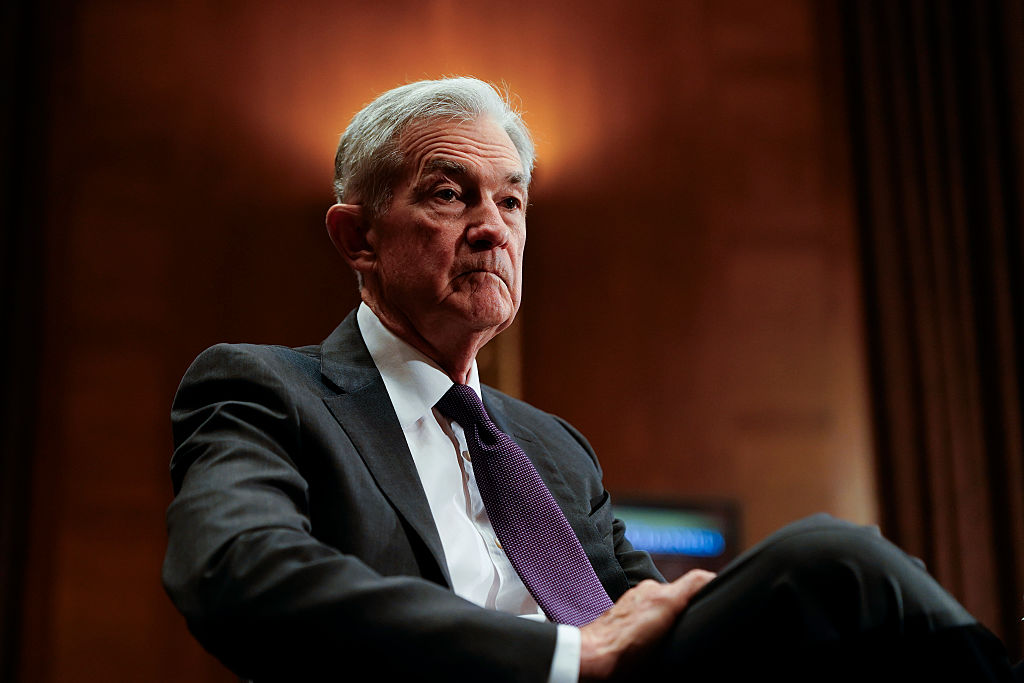US inflation may have peaked, but it remains a threat
US inflation fell to 8.5% in July, down from 9.1% the previous month. But structural, not transitory, forces are pushing inflation higher. It could be around for some time yet.

Get the latest financial news, insights and expert analysis from our award-winning MoneyWeek team, to help you understand what really matters when it comes to your finances.
You are now subscribed
Your newsletter sign-up was successful
Want to add more newsletters?

Twice daily
MoneyWeek
Get the latest financial news, insights and expert analysis from our award-winning MoneyWeek team, to help you understand what really matters when it comes to your finances.

Four times a week
Look After My Bills
Sign up to our free money-saving newsletter, filled with the latest news and expert advice to help you find the best tips and deals for managing your bills. Start saving today!
Has US inflation finally peaked? Annual inflation fell to 8.5% in July, down from 9.1% the previous month. The fall was driven by a 7.7% month-on-month slump in US petrol prices in July. The data prompted traders to conclude that the Fed might not have to raise interest rates as aggressively as feared. Strong employment data – the economy added half a million jobs in July – has also encouraged bets that the economy may dodge a recession. The S&P 500 index has gained 11% in a month.
Even if the US has passed the peak, it will be some time before inflation comes back down to earth. As Campbell Harvey of Research Affiliates points out, there has been so much inflation in recent months that even if prices now remain flat for the rest of the year – an unlikely scenario – then headline annual inflation will still be at more than 6% in December.
Inflation is structural, not transitory
And structural forces (such as de-globalisation) are pushing prices higher. The data “gives as much reason for consternation as for celebration”, says The Economist. Annual core inflation – a measure that strips out volatile food and energy prices – is running at 5.9%, the same as the previous month.
MoneyWeek
Subscribe to MoneyWeek today and get your first six magazine issues absolutely FREE

Sign up to Money Morning
Don't miss the latest investment and personal finances news, market analysis, plus money-saving tips with our free twice-daily newsletter
Don't miss the latest investment and personal finances news, market analysis, plus money-saving tips with our free twice-daily newsletter
The strong labour market is fuelling pay growth, with wages up by an annual 5.2% over the past three months. That suggests price rises are becoming embedded in the economy, heralding “structural” rather than “transitory” inflation. While the headline numbers were good, “inflation remains both broad-based and far above the Fed’s target”, says James Mackintosh in The Wall Street Journal. Investors’ optimism is misplaced – “there’s no sign the Federal Reserve will change its mind and agree with investors that rates should come down again next year”.
Equity traders are also failing to price in the effects of the coming slowdown on corporate earnings, which they blithely expect to continue rising this year and next. Bond markets seem to be expecting “one sharp round of tightening –comprised of a rise in short-term interest rates to just above 3%” that will “be enough to bring inflation down to 2.5% with stable growth and no dent in earnings”, says Bob Prince of Bridgewater Associates.
That looks optimistic, says John Mauldin in his Thoughts from the Frontline newsletter. “Bond investors seem to have a great deal of faith that the Fed… will make inflation recede sharply and soon.” Markets usually know better than individuals, but there has been so much central bank intervention in the bond market that arguably “it is no longer a market in any meaningful sense”. Central bankers are likely to lose their nerve when recession bites, slashing rates too early even while inflation is not back under control. The result? “Extended stagflation is our most likely destination.”
Get the latest financial news, insights and expert analysis from our award-winning MoneyWeek team, to help you understand what really matters when it comes to your finances.
Alex is an investment writer who has been contributing to MoneyWeek since 2015. He has been the magazine’s markets editor since 2019.
Alex has a passion for demystifying the often arcane world of finance for a general readership. While financial media tends to focus compulsively on the latest trend, the best opportunities can lie forgotten elsewhere.
He is especially interested in European equities – where his fluent French helps him to cover the continent’s largest bourse – and emerging markets, where his experience living in Beijing, and conversational Chinese, prove useful.
Hailing from Leeds, he studied Philosophy, Politics and Economics at the University of Oxford. He also holds a Master of Public Health from the University of Manchester.
-
 Early signs of the AI apocalypse?
Early signs of the AI apocalypse?Uncertainty is rife as investors question what the impact of AI will be.
-
 Reach for the stars to boost Britain's space industry
Reach for the stars to boost Britain's space industryopinion We can’t afford to neglect Britain's space industry. Unfortunately, the government is taking completely the wrong approach, says Matthew Lynn
-
 How a dovish Federal Reserve could affect you
How a dovish Federal Reserve could affect youTrump’s pick for the US Federal Reserve is not so much of a yes-man as his rival, but interest rates will still come down quickly, says Cris Sholto Heaton
-
 New Federal Reserve chair Kevin Warsh has his work cut out
New Federal Reserve chair Kevin Warsh has his work cut outOpinion Kevin Warsh must make it clear that he, not Trump, is in charge at the Fed. If he doesn't, the US dollar and Treasury bills sell-off will start all over again
-
 'Investors should brace for Trump’s great inflation'
'Investors should brace for Trump’s great inflation'Opinion Donald Trump's actions against Federal Reserve chair Jerome Powell will likely stoke rising prices. Investors should prepare for the worst, says Matthew Lynn
-
 'Governments are launching an assault on the independence of central banks'
'Governments are launching an assault on the independence of central banks'Opinion Say goodbye to the era of central bank orthodoxy and hello to the new era of central bank dependency, says Jeremy McKeown
-
 Will Donald Trump sack Jerome Powell, the Federal Reserve chief?
Will Donald Trump sack Jerome Powell, the Federal Reserve chief?It seems clear that Trump would like to sack Jerome Powell if he could only find a constitutional cause. Why, and what would it mean for financial markets?
-
 Can Donald Trump fire Jay Powell – and what do his threats mean for investors?
Can Donald Trump fire Jay Powell – and what do his threats mean for investors?Donald Trump has been vocal in his criticism of Jerome "Jay" Powell, chairman of the Federal Reserve. What do his threats to fire him mean for markets and investors?
-
 Do we need central banks, or is it time to privatise money?
Do we need central banks, or is it time to privatise money?Analysis Free banking is one alternative to central banks, but would switching to a radical new system be worth the risk?
-
 Will turmoil in the Middle East trigger inflation?
Will turmoil in the Middle East trigger inflation?The risk of an escalating Middle East crisis continues to rise. Markets appear to be dismissing the prospect. Here's how investors can protect themselves.